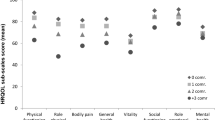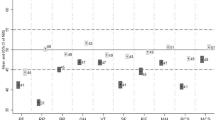Abstract
Introduction
The increase in breast cancer survival poses a challenge for patients to be able to rejoin their professional and social life in very similar conditions to those before diagnosis. The aim of this study is to assess short- and medium-term social, economic and professional impact of BC among women diagnosed with it.
Methods
A cross-sectional descriptive study using QLQ-C30, QLQ-BR23, and MOS-SSS instruments and a semi-structured interview in women diagnosed in years 2011, 2014, and 2016 in Hospital de la Santa Creu i Sant Pau in Barcelona (Spain).
Results
175 patients were included with a mean age of 55. About 62.8% were married or coupled, 76% were living with their family unit, and 52.6% denied changes in their living situation. The mean Support Global Index was 74.7% and 78.8% before and after diagnosis, respectively. The mean global quality of life (QOL) was 67.3%, outstanding insomnia as the main symptom (X > 30%) and sexual function as the most affected dimension. At the moment of diagnosis, two-thirds of patients were working. After diagnosis, 87.5% stopped working, 39.4% were off work for 7–12 months, and only 50% returned to work. Multivariate analysis identified working as the most associated variable with a good QOL.
Conclusions
QOL among women diagnosed with breast cancer is quite high and stable. Nevertheless, there are some very relevant aspects to QOL that need to be considered whilst caring for patients with BC to achieve rehabilitation as complete and comprehensive as possible.
Similar content being viewed by others
References
World Health Organization. Cancer Incidence in Five Continents Volume X. CI5X. 2013. https://ci5.iarc.fr/CI5-X/Pages/download.aspx. Accessed 10 Sept 2017.
GLOBOCAN. Estimated incidence, mortality and prevalence, 2012. https://globocan.iarc.fr/Default.aspx. Accessed 5 June 2018.
Área de Epidemiología Ambiental y Cáncer. Centro Nacional de Epidemiología. ISCIII. Mortalidad por cáncer y otras causas en España año 2015. https://www.isciii.es/ISCIII/es/contenidos/fd-servicios-cientifico-tecnicos/fd-vigilancias-alertas/fd-epidemiologia-ambiental-y-cancer/Mortal2015.pdf. Accessed 10 Sept 2017.
Sociedad Española de Oncología Médica. SEOM. Las cifras del cáncer en España 2018. 2018. https://seom.org/seomcms/images/stories/recursos/Las_Cifras_del_cancer_en_Espana2018.pdf. Accessed 10 Apr 2018.
Instituto Nacional de Estadística. INE base/Sociedad/Salud /Estadística de defunciones según la causa de muerte/Resultados. https://www.ine.es/dyngs/INEbase/es/operacion.htm?c=Estadistica_C&cid=1254736176780&menu=resultados&idp=1254735573175. Accessed 11 Sept 2017.
Galceran J, Ameijide A, Carulla M, Mateos A, Quirós JR, Rojas D, Alemán A, Torrella A, Chico M, Vicente M. Cancer incidence in Spain, 2015. Clin Transl Oncol. 2017;19:799–825.
REDECAN. Estimaciones de la incidencia y la supervivencia del cáncer en España y su situación en Europa. 2014. https://redecan.org/es/page.cfm?id=196&title=estimaciones-de-la. Accessed 10 Sept 2017.
Peuckmann V, Ekholm O, Sjøgren P, Rasmussen NK, Christiansen P, Møller S, Grønvold M. Health care utilisation and characteristics of long-term breast cancer survivors: nationwide survey in Denmark. Eur J Cancer. 2009;45:625–33.
Aaronson NK. Assessment of quality of life and benefits from adjuvant therapies in breast cancer. In: Senn HJ, Gelber RD, Goldhirsch A, Thürlimann B (eds) Adjuvant therapy of breast cancer IV. Recent results in cancer research, vol 127. Springer, Berlin, Heidelberg. 1993.
Fallowfield LJ. Assessment of quality of life in breast cancer. Acta Oncol. 1995;34:689–94.
Perry S, Kowalski TL, Chang C-H. Quality of life assessment in women with breast cancer: benefits, acceptability and utilization. Health Q L Outcomes. 2007;5:24.
Schleife H, Sachtleben C, Barboza CF, Singer S, Hinz A. Anxiety, depression, and quality of life in German ambulatory breast cancer patients. Breast Cancer. 2014;21:208–13.
Dialla PO, Chu W-O, Roignot P, Bone-Lepinoy M-C, Poillot M-L, Coutant C, Arveux P, Dabakuyo-Yonli TS. Impact of age-related socio-economic and clinical determinants of quality of life among long-term breast cancer survivors. Maturitas. 2015;81:362–70.
Bradley CJ, Neumark D, Bednarek HL, Schenk M. Short-term effects of breast cancer on labor market attachment: results from a longitudinal study. J Health Econ. 2005;24:137–60.
Pryce J, Munir F, Haslam C. Cancer survivorship and work: symptoms, supervisor response, co-worker disclosure and work adjustment. J Occup Rehabil. 2007;17:83–92.
De Boer A, Verbeek J, Spelten ER, Uitterhoeve ALJ, Ansink AC, De Reijke TM, Kammeijer M, Sprangers MAG, Van Dijk FJH. Work ability and return-to-work in cancer patients. Br J Cancer. 2008;98:1342–7.
Bouknight RR, Bradley CJ, Luo Z. Correlates of return to work for breast cancer survivors. J Clin Oncol. 2006;24:345–53.
Johnsson A, Fornander T, Rutqvist L-E, Vaez M, Alexanderson K, Olsson M. Predictors of return to work ten months after primary breast cancer surgery. Acta Oncol. 2009;48:93–8.
Spelten ER, Verbeek J, Uitterhoeve ALJ, Ansink AC, Van Der Lelie J, De Reijke TM, Kammeijer M, De Haes J, Sprangers MAG. Cancer, fatigue and the return of patients to work—a prospective cohort study. Eur J Cancer. 2003;39:1562–7.
Verbeek J, Spelten E, Kammeijer M, Sprangers M. Return to work of cancer survivors: a prospective cohort study into the quality of rehabilitation by occupational physicians. Occup Environ Med. 2003;60:352–7.
Cabanes A, Pérez-Gómez B, Aragonés N, Pollán M, López-Abente G. La situación del cáncer en España, 1975–2006. Madrid: Instituto de Salud Carlos III; 2009. p. 20–83.
Spelten ER, Sprangers MA, Verbeek JH. Factors reported to influence the return to work of cancer survivors: a literature review. Psycho-Oncology. 2002;11:124–31.
Stewart DE, Cheung AM, Duff S, Wong F, McQuestion M, Cheng T, Purdy L, Bunston T. Long-term breast cancer survivors: confidentiality, disclosure, effects on work and insurance. Psycho-Oncology. 2001;10:259–63.
van Muijen P, Weevers N, Snels IA, Duijts SFA, Bruinvels DJ, Schellart AJ, Beek AJ. Predictors of return to work and employment in cancer survivors: a systematic review. Eur J Cancer Care. 2013;22:144–60.
EORTC. EORTC QLQ-C30 Scoring Manual, Third edition. 2001. https://www.eortc.be/qol/files/SCManualQLQ-C30.pdf. Accessed 11 Sept 2017.
Sherbourne CD, Stewart AL. The MOS social support survey. Soc Sci Med. 1991;32:705–14.
Requena GC, Salamero M, Gil F. Validación del cuestionario MOS-SSS de apoyo social en pacientes con cáncer. Med Clín. 2007;128:687–91.
Consorci Sanitari de Barcelona. Cohort Dama (Influència de determinants socials, estils de vida, benestar emocional i us de teràpies no convencionals en la evolució del cáncer de mama). 2016. https://www.aspb.cat/documents/cohort-dama-influencia-determinants-socials-estils-vida-benestar-emocional-us-terapies-no-convencionals-evolucio-cancer-mama/. Accessed 10 Dec 2018.
Royo Aznar A, Roura Olmeda P. Calidad de vida en pacientes intervenidas de cáncer de mama. 2012. https://ddd.uab.cat/pub/trerecpro/2012/hdl_2072_181264/TR-RoyoAznar.pdf. Accessed 11 Nov 2018.
Rey Villar R. Calidad de vida en mujeres con cáncer de mama. 2017. https://ruc.udc.es/dspace/handle/2183/18462. Accessed 11 Nov 2018.
Ministerio de Sanidad, Servicios Sociales e Igualdad. Salud sexual y reproductiva. https://www.msssi.gob.es/organizacion/sns/planCalidadSNS/encuestaSSIntro.htm. Accessed 12 Sept 2017.
Generalitat de Catalunya. Resultats de l’enquesta de salut de Catalunya (ESCA). Departament de Salut. https://salutweb.gencat.cat/ca/el_departament/estadistiques_sanitaries/enquestes/esca/resultats_enquesta_salut_catalunya/. Accessed 12 Sept 2017.
Duijts SF, van Egmond MP, Spelten E, van Muijen P, Anema JR, van der Beek AJ. Physical and psychosocial problems in cancer survivors beyond return to work: a systematic review. Psycho-Oncology. 2014;23:481–92.
Molina R, Feliu J. The return to work of cancer survivors: the experience in Spain. Work Cancer. 2013;46:417–22.
Acknowledgements
The authors also thank all the women who participated in our study and of the public meeting “Entre Nosaltres”, the healthcare staff for their collaboration, and Ignasi Gich for his support with the statistical analysis and Laura Samsó for her help in translating the manuscript. Dr. Angela Merchán is a Ph.D. candidate in Methodology of Biomedical Research and Public Health Program, Universitat Autònoma de Barcelona, Spain. Breast Cancer Research Group of the Hospital de la Santa Creu i Sant Pau: Jaume Masià Ayala, Xavier Bonfill Cosp, M. Jesús Quintana Ruiz, Carolina Requeijo Lorenzo, Karla Salas Gama, Esther Cánovas Martínez, Agustí Barnadas Molins, Bárbara García-Valdecasas Vilanova, Antonio Moral Duarte, Gemma Pons Playa, Josep Isern Verdum, M. Josefa Fuentes Raspall, Elena Rodríguez Bauza, Magdalena Ciendones Carbonell, Ángela Merchán Galvis.
Funding
This study received funds from GC AESTHETICS.
Author information
Authors and Affiliations
Consortia
Corresponding author
Ethics declarations
Conflict of interest
The main author received funds by GC AESTHETICS. This did not influence in any way the results of this study. The other authors declare that they have no conflicts of interest.
Ethical standards
The Clinical Research Ethics Committee of the Hospital de la Santa Creu i Sant Pau approved this study. All the procedures performed in studies involving human participants were in accordance with the ethical standards of the institutional and/or national research committee, in compliance with the Spanish Organic Law 15/1999 of December 13th on the “Protection of Personal Data” and with the 1964 Helsinki Declaration and its later amendments or comparable ethical standards.
Informed consent
Informed consent was obtained from all individual participants included in the study.
Additional information
Publisher's Note
Springer Nature remains neutral with regard to jurisdictional claims in published maps and institutional affiliations.
Members of “The Breast Cancer Research Group of the HSP” are listed in acknowledgement section.
Rights and permissions
About this article
Cite this article
Masià, J., Merchán-Galvis, Á., Salas, K. et al. Socio-economic impact on women diagnosed and treated for breast cancer: a cross-sectional study. Clin Transl Oncol 21, 1736–1745 (2019). https://doi.org/10.1007/s12094-019-02185-w
Received:
Accepted:
Published:
Issue Date:
DOI: https://doi.org/10.1007/s12094-019-02185-w




